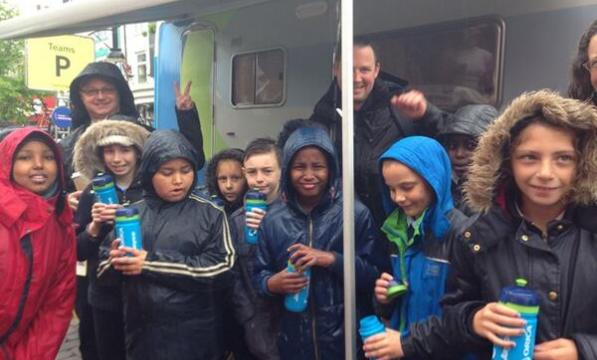The Women's Tour - does racing turn anyone on to cycling?

The Women’s Tour of Britain passed within 5 miles of my home this week and I had decided I wasn’t going to bother watching it. It’s hard to over (under?) estimate the degree to which I don’t care about competitive sport, cycling included.
I’m not sure I have the language for my degree of disinterest. No matter how much I like doing something in my daily life or admire it in yours, the minute you add competition, you’ve lost me.
I don’t know if sporting competition is shorthand for drunken brawls about weird affiliation with people you’ve never met, or hints at endless PE class misery, but whatever it is, it signals instant disengagement.
It’s hard to over (under?) estimate the degree to which I don’t care about competitive sport, cycling included."
Elizabeth Barner
CTC Cycling Development Officer for Leicester
I do like new things, though, and am wholly impressed by the things people can do with their bodies and minds. If you want to tell me about your obscure hobby, I’m happy to listen to the specifics of a 1972 double-dyed penny. Double jointed? Good scars? I’m for it. I love the Olympics in what I suspect might align me to old time Freak Shows. It’s not the competition I’m after, it’s that power lifters and speed skaters make their bodies do extreme things, in extreme shapes. For me it might not be that different from gaping at the two-headed calf or another local attraction, Daniel Lambert’s chair, specially made to allow for his stunning bulk.
When the invitation came to accompany nine 10-year-olds on a minibus to Hinckley to see athletes, I had mixed feelings about it. I was personally involved in teaching the accompanying mothers how to ride, and I was still ambiguous about it. I’m passionately engaged with equality and access, and women’s rights to their bodies. The fact that the Women’s Tour promised prize money and television coverage that equalled that of men’s races should be important. The fact that the women who joined us for cycle training can access their city in a way they couldn’t before, that they can add exercise to the whirl of parenting life is important. But I was still mixed about going out to see the actual athletes and racing.
I have absolutely no idea if high-level sporting competition leads to healthful exercise amongst the rest of the population. Some studies seem to suggest it does, others that the watchers of sport are unmoved from their armchairs. I’m hugely impressed by Stefan Thomas at Barley Croft school, who took the chance that new experiences and engagement with sport will inspire. It’s not easy to get permission to take children out of school for an event, but he did so I went along and supported where I could. We swotted up on local names in the race on the night before and during the half-hour ride in the bus in the hope of being Adults in Authority.
Which is how I came to be in Hinckley with nine children and three mothers to entertain for two hours in the continuing rain. [An aside: I can understand why weather forecasts from 7am are wrong about 7pm. Why is it that forecasts from 7am are wrong about 9am?] I had gone to meetings about the Tour and was pleased to learn from Leicestershire County Council about the access that members of the public would have to the athletes and their team supports. This was written into contracts. On the wet morning of 8 May it was our deliverance. The County Council had arranged for squash and biscuits plus entertainment in a church for school children, but mostly we milled around the very small town centre getting wetter and colder and looking at bunting. There's only so much you can do in a church or a rainy street with a bunch of bored children no matter how festive the atmosphere; waiting is not an appealing activity. When the teams arrived and set up gazebos and sheltered in vans and covered alleys, the kids were interested. I was interested. Waiting for a photo with Lucy Garner (our local hero) was saved by watching her teammates write notes on masking tape and try to attach them to their wet bikes. Autographs were out (nothing dry), but supporting the kids to ask what was on the tape connected us to this experience in a way that just watching athletes couldn’t have.

Sheltering from the rain but enjoying the experience of women's cycle racing
He introduced his star rider, who had won the first stage the day before. None of us had the faintest idea who she was, but all understood this was something special."

